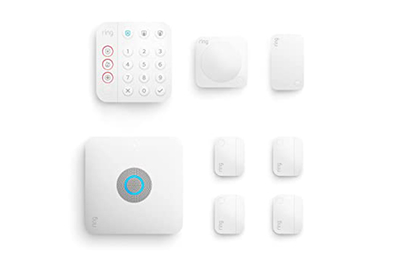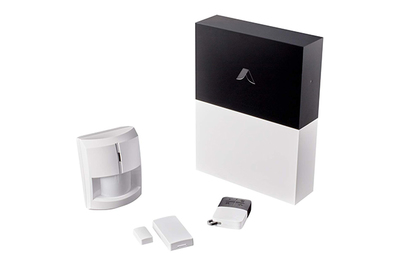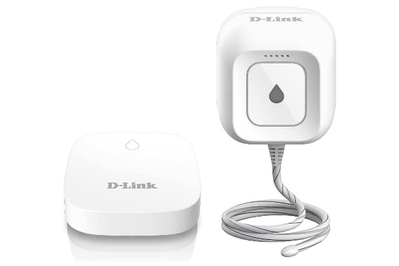Compatible with: Amazon Alexa, Apple HomeKit (with a compatible base station), Google Home, IFTTT, Samsung SmartThings
How it helps: Being able to keep a clear eye around your home—and share it with a caretaker or loved one—provides tremendous peace of mind. The Arlo Pro 4 Spotlight Camera can accurately determine whether that motion is a person, animal, car, or package. Arlo also offers a 24/7 recording option, which ensures that you have a full record of anyone who comes by your home at any time (enabling requires a pricier subscription and extra equipment).
Why it’s a pick: The Arlo Pro 4 Wi-Fi camera combines clear 2K video and can record up to five minutes of continuous motion. To store recordings, you’ll need a subscription to Arlo Secure (starting at $8 per month), which includes the ability to distinguish between people, pets, packages, and vehicles. It runs on a rechargeable battery, but if you live in a high-traffic area, you may find yourself charging it monthly. If that’s the case, consider buying an extra battery, a solar panel, or hardwiring the camera via an outdoor cable.
Home security systems

A home security system can help prevent break-ins. But it also includes sensors that remind you when a door or window has been left open, cameras that can notify you when a caretaker is coming and going, and smoke detectors that alert you if there’s a fire (or eggs are burning in the pan). Some systems also offer other helpful add-ons, including water sensors, keypads, key fobs, glass-break sensors, and panic buttons—all of which you can access via a single app (instead of juggling several).
We strongly recommend adding a professional monitoring plan to any security system, so that in the event of an alarm, a live person from a call center will alert you, your loved ones, and anyone else you deem an emergency contact. The call center can also contact the police or fire department if needed, or if no one can be reached.
Our pick
Compatible with: Amazon Alexa, Works With Ring
How it helps: The Ring Alarm Pro includes a built-in Eero Wi-Fi 6 router, which should boost the speed and range of your home internet network. And the base of the Ring system has a battery that supplies 24 hours of backup power (which can be boosted for another 24 hours via add-on power packs).
Why it’s a pick: Ring’s sensors perform great, and the company offers more types of indoor and outdoor camera add-ons than any other system we’ve tested. It also offers the biggest bang for your buck when it comes to professional monitoring ($20 per month or $200 per year).
The monthly monitoring subscription includes internet backup, so if your power goes out or your home internet service goes down, you’ll continue to have access via a cellular connection. That lets you keep the system online and continue to have functioning security cameras, and you can also access the internet for email or services like Netflix (up to 3GB; otherwise it’s $3 per 1 GB).
Compatible with: Amazon Alexa, Apple Home, Google Home, and others
How it helps: Abode Smart Security Kit takes a bit more technical know-how and requires Abode’s subscription plan (starting at $7 per month or $70 per year), but this DIY system is compatible with far more smart-home devices than any other.
Why it’s a pick: The Abode Smart Security Kit works with smart lighting, thermostats, voice control, and pretty much every other kind of smart-home device. Abode also offers a lot of add-ons, including several types of sensors, cameras, and a smoke-alarm monitor that works in conjunction with your existing UL-listed smoke detector.
Smart water-leak detectors

About one in 50 US households each year file an insurance claim related to water-damage incidents, according to the Insurance Information Institute. Those often happen in hard-to-reach areas like the basement, by the water heater, or behind the washing machine. Smart water-leak sensors can alert you the instant water is detected by sending an alert to your smartphone. And some also emit an audible alarm or can trigger lights and sounds so you can tackle small leaks before they become a big headache.
Our pick
Compatible with: Google Home, IFTTT
How it helps: A good leak sensor ensures you are made aware of detected water, even if you aren’t home or nearby. The best models have a loud alarm and the ability to integrate with smart-home platforms so you can receive smart alerts. We also prefer when alerts can be silenced in the app, so you don’t need to physically access the detector (or wade through water) to silence an alarm.
Why it’s a pick: With a 94 dB alarm built into the plug-in hub, the D-Link DCH-S1621KT is the loudest one of our picks. That hub includes an optional sensor cable to detect water around the hub, but the system can also monitor up to 16 other locations using add-on battery-powered sensors.
When water is present, the alarm and smartphone alerts can be silenced in the app, but it can’t be turned off—so if water is still present, it will keep alerting you. If that’s a concern, opt for the Flo by Moen Smart Leak Detector, which can be turned off at the device or in the app. It can also detect temperature, but it doesn’t have a loud audible alarm and doesn’t integrate with any smart-home platforms.






